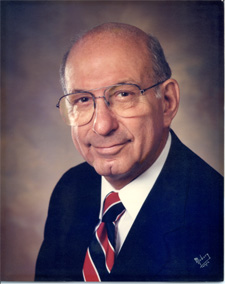 What is the Award?
What is the Award?
THE RICHARD S. HODES, M.D. HONOR LECTURE AWARD honors the memory of The Commission’s late chairman, Dr. Richard S. Hodes, a strong proponent for innovation in the field of low-level radioactive waste management. Dr. Hodes was a physician, statesman, educator, and, for 19 years, chairman of the Southeast Compact Commission for Low-Level Radioactive Waste Management. The award was created by the Commission to encourage environmental professionals and political leaders to develop innovative approaches to waste management in the United States and, in doing so, to further the mission and objectives of the Southeast Compact Commission.
Inquiries about the Richard S. Hodes, M.D. Honor Lecture Award should be directed to:
Tom Hansen, Executive Director
Southeast Compact Commission
PO Box 31525
Knoxville, TN 37930
Office: 919.380.7780
Email: tom@secompact.org or visit the Commission web site at www.secompact.org.
Biography of Dr. Hodes
Dr. Richard S. Hodes (1921-2002) was a distinguished statesman and a lifetime scholar. A graduate of Tulane University School of Medicine, Dr. Hodes was an anesthesiologist in private practice for more than forty years in Tampa, Florida. He also served as Professor and Chairman of the Department of Anesthesiology at the University of South Florida and was Clinical Director for Florida Medical Quality Assurance. He served terms as president of the Florida Medical Association, the Hillsborough County Medical Association, and the Florida Society of Anesthesiologists.
Dr. Hodes served six terms in the Florida House of Representatives, was Majority Leader in 1980-1982 and Speaker pro tempore in 1978-1980, and was President of the National Conference of State Legislatures in 1980-1981.
In 1981, Dr. Hodes represented the State of Florida as one of the negotiators who crafted legislation that eight state legislatures would enact to create the Southeast Compact, in itself an innovative approach to public policy in waste management. In 1983, he was appointed as one of the first Commissioners from Florida to the Southeast Compact Commission for Low-Level Radioactive Waste Management. He was elected by his peers to serve as the chair of the Southeast Compact Commission from its inception in 1983 until his death in 2002. For 19 years, he guided the Commission through numerous challenges with courage, wisdom, and integrity.
Throughout his career, Dr. Hodes developed and supported innovation in medicine, law, public policy, and technology. He constantly sought and implemented better, more creative ways to solve problems and encouraged others to do the same.
The Award
The Richard S. Hodes Honor Lecture Award—established in March, 2003—is awarded to an individual, company, or organization that contributed in a significant way to improving the technology, policy, or practices of low-level radioactive waste management in the United States. The award recipient will be recognized with a special plaque and an invitation to present a lecture at the Waste Management Symposia which is held in Phoenix, Arizona. A special time is reserved during the Conference for the lecture and the award presentation. The Southeast Compact Commission will provide the award recipient a $5,000 honorarium and will pay travel expenses and per diem (in accordance with Commission Travel Policies) for an individual to present the lecture.
Criteria
The Richard S. Hodes Honor Lecture Award recognizes industry-wide contributions in the field of radioactive waste management. The award is not limited to any specific endeavor—contributions may be from any type of work with radioactive materials (nuclear energy, biomedical, research, etc.), or in any facet of that work, such as planning, production, maintenance, administration, or research. The types of contributions to be considered include, but are not limited to:
- Conception and development of approaches, improvements, or practices in the prevention, management, and regulation of radioactive waste;
- Technologies or practices in the art and science of waste management; and
- Educational approaches in the field of waste management.
The criteria for selection include:
- Innovation. Is the improvement unique? Is or was it a fresh approach to a standard problem? Is it a visionary approach to an anticipated problem?
- Safety. Does the practice enhance radiation protection?
- Economics. Does the approach produce significant cost savings to government, industry, or the public?
- Transferability. Is this practice applicable in other settings and can it be replicated? Does it increase the body of technical knowledge across the industry?
Eligibility
To be eligible for the award, the individual/group must consent to being nominated and must be willing to prepare and present a lecture about the innovation being recognized at the Waste Management Symposium. Individuals or organizations can nominate themselves or another individual, company, institution, or organization.